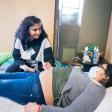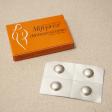Diane Tober, PhD, has always been a research-minded person, even before she knew what that meant. As a kid, she always wanted to know “why?” and didn’t want to follow instructions unless she got a good answer. She gravitated toward activities that fed her hunger for knowledge and solidified her thinking on the need to fight for what’s right. “Those are two things that I would say are ingrained in me—justice and curiosity,” she says.
That intersection led her to a career examining thorny questions around reproduction as a Medical Anthropologist in the UCSF School of Nursing. In her graduate school days assisting on a project on gender differences in response to infertility, she fielded calls from single women and lesbian couples who were interested in participating in the study but didn’t fit the recruitment criteria of the National Institutes of Health grant. She became curious about their stories and was inspired to look beyond the narrow way society defined infertility as a medical condition.
Dr. Tober started her own project exploring how people thought about choosing a sperm donor. She was fascinated by the ways people chose a donor when they weren’t trying to match a male partner in the couple. It was a window into underlying notions about what people want to be produced in society. She saw how people latched on to traits, like the couple who didn’t wanting to choose anyone with any Germanic background because of World War II. “It’s interesting how people think about what is actually in the sperm,” she says. “I was interested in how cultural notions of biology enact through people’s bodies and how reproduction is both personal and political.”
That work led to her book Romancing the Sperm, an exploration of these issues that was 20 years in the making. Dr. Tober’s long-term commitment to that work allowed her to gain valuable perspective over a time period when our society’s ideas about marriage and gender evolved significantly. Same-sex marriage became legal across the country, and yet other issues persist, like complicated discussions about maintaining parental rights or struggles to list two mothers on a birth certificate in some states.
Now Dr. Tober is diving into the fraught issue of egg donation. One of Dr. Tober’s major concerns is the lack of information about the impacts of the egg donation process—which includes weeks of hormone injections and surgery under anesthesia—on donors’ health and well-being. She’s now interviewing egg donors from around the world in the largest known study on the issue to date. With funding from The National Science Foundation, she is leading a three-year, collaborative study comparing egg donation in the United States and Spain, two countries with very different approaches to regulating egg and sperm donation. “I’m very interested in the degree to which egg donors’ decisions and experiences may differ in these two different cultural and regulatory contexts.”
While some egg donors know what they’re getting into, a lot of them aren’t very informed. The opportunity to make thousands of dollars entices them to take risks that haven’t been fully explored, especially if they face financial struggles. Dr. Tober hopes her research will help fill in those gaps and inform best practices moving forward. “Some people have had positive experiences. They’ve had no health complications. And I would like to see that everybody had those opportunities.”

